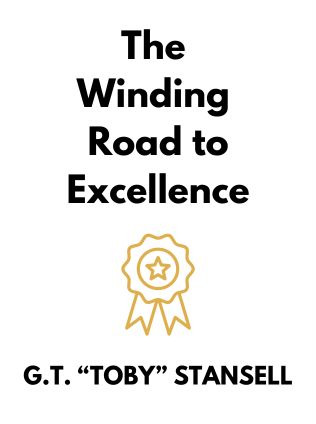
The Winding Road to Excellence
Leadership Lessons Learned from Life's Potholes
By G.T. “Toby” Stansell
Published 08/2023
About the Author
G.T. “Toby” Stansell is a seasoned business leader with a wealth of experience in various executive roles. His journey through different leadership positions has equipped him with valuable insights and practical wisdom that he shares in his book, "The Winding Road to Excellence: Leadership Lessons Learned from Life’s Potholes." Stansell’s ability to blend personal experiences with strategic business advice makes his work both relatable and impactful. His emphasis on authenticity, humility, and a continuous pursuit of excellence has inspired many to rethink their approach to leadership.
Main Idea
"The Winding Road to Excellence" revolves around the concept that great leaders are architects of a thriving corporate culture. Through a series of thought-provoking mantras, Stansell offers guidance on achieving personal and professional excellence, building valuable teams, and fostering a positive and sustainable organizational culture. The book emphasizes the importance of authenticity, humility, and learning from failures as crucial elements in the journey towards leadership excellence.
Table of Contents
- Part 1: Personal and Professional Excellence: People Who Do
- Chapter 1: Never Give in to Fear
- Chapter 2: Making the Most of What You Have
- Chapter 3: It’s Either Results or Excuses
- Chapter 4: People Who Do Simply Believe They Can
- Chapter 5: The Test of Personal and Professional Maturity
- Chapter 6: Being Right is Overrated
- Chapter 7: Humility is More Important than Visibility
- Chapter 8: Your Greatest Weakness May Be an Unprotected Strength
- Chapter 9: Failure Is an Early Indicator Of Impending Success
- Chapter 10: Responsible Decision-Making
- Chapter 11: The Four Cs of Teamwork
- Part 2: Leadership Excellence: Lead from the Middle
- Chapter 12: Everybody from The Janitor to The King Deserves to Be Treated Well
- Chapter 13: Authentic Leaders Measure Results, Not Style
- Chapter 14: An Organizational Chart May Give You a Position, But Only People Can Grant You Power
- Chapter 15: Great Leaders Learn How to Think Beyond
- Chapter 16: The Test of Authentic Leadership
- Part 3: Organizational Excellence: Culture Trumps Strategy
- Chapter 17: Culture = Organizational Personality
- Chapter 18: The Seven Seas (Cs) Of Hiring
- Chapter 19: Digital Communication and The Demise Of Genuine Dialogue
- Chapter 20: Technically Priceless But Practically Worthless
- Part 4: Sales Excellence: Customers Don’t Want to Be Sold; They Want To Be Served
- Chapter 21: The Reverse-Negative Selling Model
- Chapter 22: Sales Is A Science, Not A Science Project
- Part 5: Business Excellence: Find Something You Do Well and Perfect It
- Chapter 23: Crooked Wire Value
- Chapter 24: Decision-Making by The Numbers
- Chapter 25: Many Times, The Things We Want to do the Least Are the Things We Ought to Do the Most
- Conclusion: Be Present
Part 1: Personal and Professional Excellence: People Who Do
Chapter 1: Never Give in to Fear
In the first chapter, Stansell emphasizes the importance of overcoming fear to seize opportunities. He suggests that confidence grows from confronting fears and encourages leaders to adopt mantras such as:
“Stop trying to draw attention and start paying attention” - G.T. “Toby” Stansell
“Humility is more important than visibility” - G.T. “Toby” Stansell
These principles guide leaders towards a quiet confidence that drives extraordinary results without seeking the limelight.
Chapter 2: Making the Most of What You Have
Stansell argues that everyone has a balance of assets and liabilities, and comparing oneself to others is futile. He advises leaders to be competitive without being comparative, focusing instead on leveraging their unique strengths.
Key takeaways include:
- Acknowledging that everyone's assets and liabilities are equally distributed but differently visible.
- Fostering self-improvement rather than envy or ego boosts.
Chapter 3: It’s Either Results or Excuses
Here, Stansell discusses the importance of accountability and results-oriented culture. He highlights the necessity of balancing empowerment with accountability and introduces the concept of the six Cs:
Sign up for FREE and get access to 1,400+ books summaries.
You May Also Like
The Subtle Art of Not Giving a F*ck
A Counterintuitive Approach to Living a Good Life
By Mark MansonRich Dad Poor Dad
What the Rich Teach Their Kids About Money - That the Poor and Middle Class Do Not!
By Robert T. KiyosakiHow To Win Friends and Influence People
The All-Time Classic Manual Of People Skills
By Dale CarnegieQuiet: The Power of Introverts
The Power of Introverts in a World That Can't Stop Talking
By Susan Cain



















